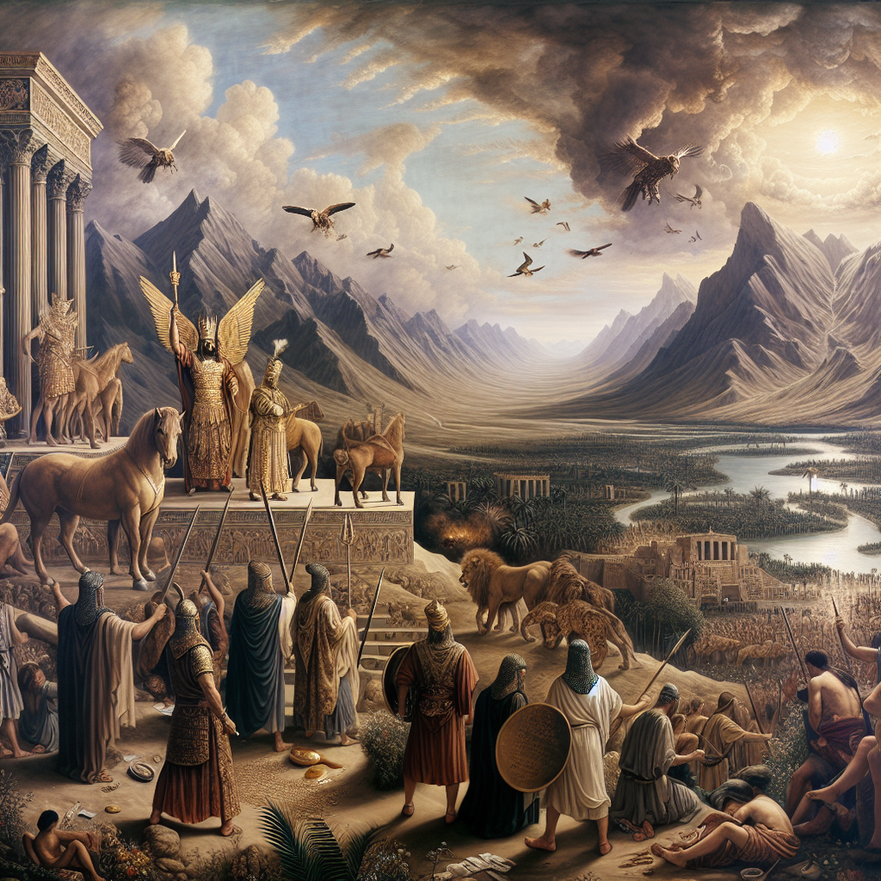Isaiah 14-16: God's Judgment and Compassion, Pride and Humility

Isaiah 14-16: Analysis and Reflection
Key Verses
- Isaiah 14:1-3: This passage highlights God's compassion and promise of restoration for Israel, emphasizing that they will possess their oppressors.
- Isaiah 14:12-15: Known for its depiction of the fall of "Lucifer," this section symbolizes the downfall of the Babylonian king due to pride.
- Isaiah 15:1-2: An oracle against Moab, describing the sudden destruction of Moabite cities and the mourning that follows.
- Isaiah 16:1-2: Calls for Moab to send tribute to Judah, illustrating the vulnerability and displacement of the Moabites.
Themes
- God's Judgment and Compassion: These chapters juxtapose God's judgment on nations like Babylon and Moab with His compassion and restoration for Israel. This duality underscores God's justice and mercy.
- Pride and Humility: The fall of the Babylonian king serves as a cautionary tale against pride. It contrasts with Israel's restoration, which is rooted in humility and reliance on God.
- God's Sovereignty: The prophecies demonstrate God's control over nations, highlighting His ability to enact justice and fulfill His promises.
Historical Context
- Time Period: Isaiah's prophecies were written between 740 and 680 BCE.
- Political Climate: The Assyrian Empire was a dominant force, and Judah faced threats from both Assyria and Babylon. The prophecies against Babylon and Moab reflect the geopolitical tensions of the time.
- Significant Events: The prophecy against Babylon likely aligns with the reign of King Hezekiah, while the oracle against Moab might date back to King Uzziah's reign.
Cultural Context
- Assyrian and Babylonian Empires: These empires were known for their military might and idolatrous practices, which are reflected in the prophecies against them.
- Moabite Customs: The Moabites had distinct cultural and religious practices, often at odds with Israel's monotheism, which is evident in the lament over their cities' destruction.
Etymology
- "Lucifer" (הֵלֵל - helel): Often translated as "morning star" or "day star," this term refers to the Babylonian king's fall from power, symbolizing pride and downfall.
- "Sheol" (שְׁאוֹל - sheol): Refers to the underworld or the realm of the dead, where the proud king is destined to descend.
Put it into Practice
- Humility and Trust: Embrace humility and trust in God's sovereignty, recognizing the dangers of pride in personal and spiritual life.
- Compassion and Restoration: Reflect on God's compassion and seek restoration in personal struggles, drawing parallels to Israel's redemption.
- Justice and Mercy: Apply principles of justice and mercy in daily interactions, inspired by God's dealings with nations.
Questions
- How does the concept of God's sovereignty influence your understanding of current world events and personal challenges?
- In what ways can you demonstrate humility and trust in God's plans for your life?
- How can you incorporate justice and mercy into your relationships and community engagements?
These reflections on Isaiah 14-16 encourage a deeper understanding of God's character and His expectations for His followers, offering valuable insights for personal spiritual growth.